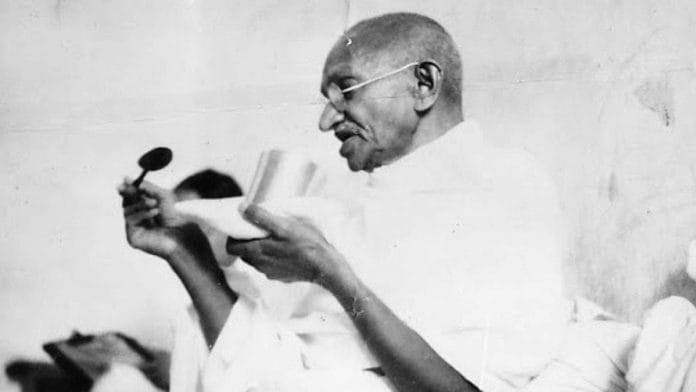The euphoria surrounding the Ram temple’s consecration in Ayodhya on 22 January with the Indian state leading the ceremony has entirely eclipsed the once ubiquitous but now forgotten interpretation of Ram—an all-powerful, omnipresent deity that MK Gandhi revered and advocated throughout his life. Despite being a devout Hindu and a passionate proponent of Ramanama—the chanting of Ram’s name—Gandhi’s version of Ram is often ignored by the Hindu right because it doesn’t align with their political agenda.
Gandhi’s connection with Ram began when he was a child as a means to overcome his fear of ghosts and spirits. His nurse, Rambha, introduced him to the chant of Ramanama. Although the effect was temporary, it planted the seeds for what would become ‘an infallible remedy’ for his entire life. It is widely believed that his life ended with Ram’s name on his lips.
Although Gandhi was deeply spiritual and identified himself as a Sanatani Hindu, he distanced himself from superstitions and rituals. He viewed the recitation of Ramanama as the unfailing panacea for all the ills—physical, mental, and spiritual. “You may substitute Krishna for Ram or you can substitute for it any of His countless names and it will make no difference,” he said.
When Gandhi received advice from a correspondent advocating the prioritisation of Ramanama over Swaraj, he replied that Ramanama couldn’t be propagated in a manner similar to Khadi and Swaraj. He highlighted the concern that sinners often invoke the Ramanama mantra to justify their misdeeds, which is why he was apprehensive about the chant being exploited for propaganda purposes. Gandhi firmly held the belief that those wishing to spread Ramanama should first persuade and purify themselves, and establish Ram’s kingdom within their own hearts.
Also Read: Is Ram a symbol of a united India or of Hindu victory? The answer will shape new India
Ram as a cure
As a proponent of naturopathy, Gandhi believed that Ramanama could heal illnesses. However, he was conscious that his words could be misused to propagate superstitions. He clarified that he wasn’t referring to mere lip recitation of Ramanama. “[Ramanama] has to come from the heart. It is conscious belief in God and a knowledge of His Law that make perfect cure possible without any further aid. That law is that a perfect mind is responsible for perfect health of the body,” he stated.
When a teacher likened his emphasis on Ramanama as a healing method to psychotherapy and faith-based Christian Science, Gandhi explained that while there indeed were similarities, Ramanama was distinctly different. “Recitation of Ramanama is a mere symbol of the reality for which it stands. If one is knowingly filled with the presence of God within, one is free from all ailments, physical, mental or moral. That we do not see the type in life is not to disprove the truth of [the] statement,” he said. Gandhi conceded that trying to prove Ramanama’s healing powers was like asking someone to accept that sugar is sweet without making them taste it.
Gandhi’s belief in the power of Ramanama as a healing force resonates with the experiences of many spiritual leaders who have faced illness. For instance, Sri Ramakrishna’s journey through cancer exemplifies the profound connection between faith and healing.
Also Read: When channels aren’t chanting ‘Jai Shri Ram’, they are following Modi—ignoring Rahul Gandhi
Ram is for everyone
In a climate filled with communal sentiments, Gandhi found himself frequently clarifying his interpretation of Ram. He stated, “I have accepted all the names and forms attributed to God as symbols denoting one formless omnipresent Ram. To me, therefore, Ram described as the Lord of Sita, son of Dasharatha is the all powerful essence whose name, inscribed in the heart, removes all suffering, mental, moral and physical.”
When questioned about how Muslims could participate in singing Ram Dhun (Raghupati Raghav Raja Ram) or chanting Ramanama, Gandhi responded, “Is there one God for the Mussalmans and another for the Hindus, Parsis, or Christians? No, there is only one omnipotent and omnipresent God. He is named variously and we remember Him by the name which is most familiar to us.”
For Gandhi, Ram was not Dasharatha’s son, the King of Ayodhya. “He is the eternal, the unborn, the one without a second. Him alone I worship. His aid alone I seek, and so should you. He belongs equally to all. I, therefore, see no reason why a Mussalman or anybody should object to taking His name. But he is in no way bound to recognize God as Ramanam. He may utter himself Allah or Khuda so as not to mar the harmony of the sound.”
Another correspondence from a reader of Hindi weekly Harijan Sevak, which was founded by Gandhi, mentioned the Ramanama Bank in then-Banaras and clothing imprinted with Ramanama, describing them as a ‘mockery of Ramanama.’ He questioned Gandhi, wondering if his emphasis on the chant would foster ignorance and hypocrisy. Gandhi acknowledged this risk but said that “doing the right thing will result in their decrease, if anything, never in their increase.” He ended with a cautionary note: “Even an all-powerful remedy like Ramanama can become useless for lack of wakefulness and care, and become one more addition to the numerous current superstitions.”
While we cannot speculate on Gandhi’s views regarding the celebrations in Ayodhya, we do have his words from the first Diwali following Independence. In a post-prayer speech in Delhi, he congratulated the people and underscored the significance of Diwali as the triumph of Ram over Ravan, symbolising the victory of good over evil and the commencement of Ram rajya in India. “But alas!” Gandhi lamented, “Today there is no Ram rajya in India. So how can we celebrate Diwali? Only those who have Rama within can celebrate the victory.
Urvish Kothari is a senior columnist and writer based in Ahmedabad. He tweets @urvish2020. Views are personal.
(Edited by Theres Sudeep)






